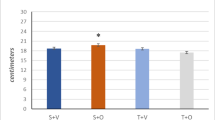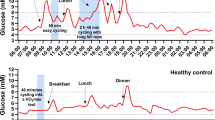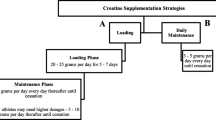Abstract
A double-blind crossover field study was performed to investigate the effects of acute L-carnitine supplementation on metabolism and performance of endurance-trained athletes during and after a marathon run. Seven male subjects were given supplements of 2 g L-carnitine 2 h before the start of a marathon run and again after 20 km of the run. The plasma concentration of metabolites and hormones was analysed 1 h before, immediately after and 1 h after the run, as well as the next morning after the run. In addition, the respiratory exchange ratio (R) was determined before and at the end of the run, and a submaximal performance test was completed on a treadmill the morning after the run. The administration of L-carnitine was associated with a significant increase in the plasma concentration of all analysed carnitine fractions (i.e. free carnitine, short-chain acylcarnitine, long-chain acylcarnitine, total acid soluble carnitine, total carnitine) but caused no significant change in marathon running time, in R, in the plasma concentrations of carbohydrate metabolites (glucose, lactate, pyruvate), of fat metabolites (free fatty acids, glycerol, β-hydroxybutyrate), of hormones (insulin, glucagon, cortisol), and of enzyme activities (creatine kinase, lactate dehydrogenase). Moreover, there was no difference in the result of the submaximal performance test the morning after the run. In conclusion, acute administration of L-carnitine did not affect the metabolism or improve the physical performance of the endurance-trained athletes during the run and did not alter their recovery.
Similar content being viewed by others
References
Barnett C, Costill DL, Vukovich MD, Cole KJ, Goodpaster BH, Trappe SW, Fink WJ (1994) Effect of L-carnitine supplementation on muscle and blood carnitine content and lactate accumulation during high-intensity sprint cycling. Int J Sports Nutr 4:280–8
Brass EP, Hoppel CL (1978) Carnitine metabolism in the fasting rat. J Biol Chem 253:2688–93
Brass EP, Hoppel CL, Hiatt WR (1994) Effect of intravenous L-carnitine on carnitine homeostasis and fuel metabolism during exercise in humans. Clin Pharmacol Ther 55:681–92
Bremer J (1983) Carnitine-metabolism and functions. Physiol Rev 63:1420–80
Cederblad G, Lindstedt S (1972) A method for the determination of carnitine in the picomole range. Clin Chim Acta 37:235–43
Ceretelli P, Marconi C (1990) L-carnitine supplementation in humans. The effects on physical performance. Int J Sports Med 11:1–14
Cooper MB, Jones DA, Edwards RH, Corbucci GC, Montanari G, Trevisani C (1986) The effect of marathon running on carnitine metabolism and some aspects of muscle mitochondrial activities and antioxidant mechanisms. J Sports Sci 4:79–87
Emmison N, Agius L (1988) Fatty acid uptake and metabolism to ketone bodies and triacylglycerol in rat and human hepatocyte cultures is dependent on chain-length and degree of saturation. Effects of carnitine and glucagon. FEBS Lett 236:83–8
Föhrenbach R, März W, Lohrer H, Siekmeier R, Evangeliou A, Böhles HJ (1993) Der Einfluss von L-Carnitin auf den Lipidstoffwechsel von Hochleistungssportlern. Dtsch Z Sportmed 44:349–56
Friolet R, Hoppeler H, Krähenbühl S (1994) Relationship between the coenzyme A and the carnitine pools in human skeletal muscle at rest and after exhaustive exercise under normoxic and acutely hypoxic conditions. J Clin Invest 94:1490–5
Fritz IB (1955) The effects of muscle extracts on the oxidation of palmitic acid by liver slices and homogenates. Acta Physiol Scand 34:367–85
Gorostiaga EM, Maurer CA, Eclache JP (1989) Decrease in respiratory quotient during exercise following L-carnitine supplementation. Int J Sports Med 10:169–74
Greig C, Finch KM, Jones DA, Cooper M, Sargeant AJ, Forte CA (1987) The effect of oral supplementation with L-carnitine on maximum and submaximum exercise capacity. Eur J Appl Physiol 56:457–60
Hultman E, Cederblad G, Harper P (1991) Carnitine administration as a tool to modify metabolism during exercise (letter). Eur J Appl Physiol 62:450
Marconi C, Sassi G, Carpinelli A, Ceretelli P (1985) Effects of L-carnitine loading on the aerobic and anaerobic performance of endurance athletes. Eur J Appl Physiol 54:131–5
Maurer C (1987) Les effets de l'adjonction orale de L-carnitine sur l'exercise intense et prolongé chez le sportif. Thesis, Université Claude-Bernard, Lyon I., France
McGarry JD, Robles-Valdes C, Foster DW (1975) Role of carnitine in hepatic ketogenesis. Proc Nat Acad Sci USA 72:4385–8
Newsholme EA, Leech AR (1994) Biochemistry for the medical sciences. J Wiley Chicester, p 319
Oyono-Enguelle S, Freund H, Ott C, Gartner M, Heitz A, Marbach J, Maccari F, Frey A, Bigot H, Bach AC (1988) Prolonged submaximal exercise and L-carnitine in humans. Eur J Appl Physiol 58:53–61
Ruff LJ, Miller LG, Brass EP (1991) Effect of exogenous carnitine on carnitine homeostasis in the rat. Biochim Biophys Acta 1073:543–9
Soop M, Bjorkman O, Cederblad G, Hagenfeldt L, Wahren J (1988) Influence of carnitine supplementation on muscle substrate and carnitine metabolism during exercise. J Appl Physiol 64:2394–9
Trappe SW, Costill DL, Goodpaster B, Vukovich MD, Fink WJ (1994) The effects of L-carnitine supplementation on performance during interval swimming. Int J Sports Med 15:181–5
Uhlenbruck G, van Mil A (1992) Immunlogische Experimente mit L-Carntin: neue, sportmedizinisch relevante Aspekte? Dtsch Z Sportmed 43 [Suppl] 1–8
Wagenmakers AJM (1991) L-carnitine supplementation and performance in man. In: Brouns F (ed) Advances in nutrition and top sport. Med Sport Sci 32:110-27
Wyss V, Ganzit GP, Rienzi A (1990) Effects of L-carnitine administration on \(\dot V\)O2 max and the aerobic-anaerobic threshold in normaxia and acute hypoxia. Eur J Appl Physiol 60:1–6
Author information
Authors and Affiliations
Rights and permissions
About this article
Cite this article
Colombani, P., Wenk, C., Kunz, I. et al. Effects of L-carnitine supplementation on physical performance and energy metabolism of endurance-trained athletes: a double-blind crossover field study. Europ J Appl Physiol 73, 434–439 (1996). https://doi.org/10.1007/BF00334420
Accepted:
Issue Date:
DOI: https://doi.org/10.1007/BF00334420




